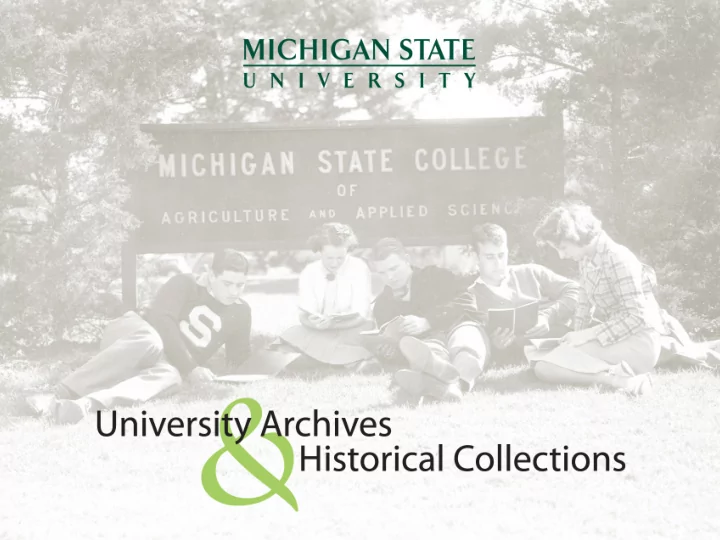

Spartan Archive: A Program in Transition Cynthia Ghering August 23, 2011 9/8/2011
Goals of Spartan Archive 3 yr project, Apr2009 to Mar 2013 , $251K for IT staff Preservation environment for born-digital records Automate ingest, manage descriptive and preservation metadata, archival storage, and public access Scalable , sustainable, and transferrable Structured/un-structured digital data Integrate with automated archival management Four records series from Registrar’s Office : - Academic Programs - Schedule of Courses - Course Descriptions - Student Directory 9/8/2011
Analog to Format-Neutral Repository Holistic approach to electronic records Hybrid (analog and digital) collections Service-oriented archives Flexible, adaptable, nimble archivists Funding model Who pays for the new “virtual storage”? Workflows for collections management Regardless of material format *Thanks to Jeanne Kramer-Smyth for the graphic. See 9/8/2011 her Spellbound Blog to order cool t-shirts!
Workflow for Collections Management • DOS-based, flat database • Migrated 4,000 records 2,000+ records on cards still • • No name or subject authorities Updating physical locations • Modified AT for records • management • Updating paper based workflows - transmittals forms - records inventories - retentions schedules 9/8/2011
Importance of Records Management MSU’s new Enterprise Business Systems Finance and HR records now born-digital or imaged Research administration in phase 2 starting soon Hybrid systems of record, “paper-sparse” Compliance with federal and state regulations Records Authority by Denver University Open-source, web-based software tool for RM Surveying departments, inventorying records Creating, managing, and distributing retention schedules 9/8/2011
Spartan Archive – Progress to Date Selected software: Fedora, iRODS, BagIt, SIARD, ARK, NOID Islandora, DROID, JHOVE, JHOVE2 Surveyed Registrar’s Office databases Clarified database structures and data fields Created XML schemas for each records series Develop Fedora collection model for each series Drafted ingest procedures for Registrar’s data 9/8/2011
Course Descriptions Field Name Full Name:Description Subj_Code Subject Code: Defines the general subject of the course. Need a list of full names Crse_Code Course Code: Identifier for the specific course Initial_Action Appears to contain “Converted” or “Changed” What do these refer to? Are there other values Course_Status 1 Whether the course has been approved or archived. If archived then this indicates that there has been a change to the course’s attributes. Are there other values? Start_Term_Seq_Id ? Start_Term_Code ? End_Term_Seq_Id ? End_Term_Code ? Interdprmntl_Flag Y/N Identifies an interdepartmental course. Interdepartmental_With Identifies the cooperating department. Can there be multiple values? Is the code used the same as the Department Code? Administered_By Identifies the department that actually runs the course. Uses Department Code (?) Coll_Code College Code: Identifier of College that offers the course. Need a list of full names. Dept_Code Department Code: Identifier of Department that offers the course. Need a list of full names. Crse_Title Course Title: Name of the course Crse_Description Course Description: Description of the course contents. Semester Semester in which the course is offered. This is a text field that describes the general rule for when the course will be offered. Credit_Type Values seem to be F, V or Null. Null appears to be associated with archived courses. What do the other codes mean(V means variable?, F fixed?) and are there other values? 9/8/2011
Registrar’s Office – Data Sources Conceptual Model The Academic Program Sessions Period Covered by Registration Accreditation Equal Opportunity Student Consumer Information Graduation Rates Colleges, Schools and Departments Programs and Areas of Study - Degrees - Teacher Certification - Course Designations - University Organization 9/8/2011
XML Schemas for Data Sources 9/8/2011
Fedora Architecture 9/8/2011
Federated Repositories Content models for research data, learning content, digital humanities NSF mandate to preserve data for long-term access Moodle requires a learning content repository for implementation Multiple digital humanities projects underway (beta) MSU Policy Repository Leverage complementary needs on campus Share progress currently underway at MSU 9/8/2011
Project Team: Rich Burgis, burgisri@msu.edu Ed Busch, buschedw@msu.edu Cynthia Ghering, ghering@msu.edu Lisa Schmidt, lschmidt@msu.edu 9/8/2011
http://msuarchives.wordpress.com/ http://www.flickr.com/photos/msuarchives/
Recommend
More recommend